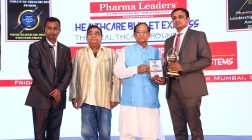Eli Lilly aims to be among top 20 pharma companies in India by 2020
Eli Lilly and Co India is looking to introduce more innovation-based products across five therapeutic segments, including diabetes, over the next six years as it aims to become one of the top 20 pharmaceutical companies in the country.
The company, which today launched an insulin delivery pen — Humapen Savvio — currently holds around 47th position in terms of revenues among pharma companies in India.
“We are committed to India and it’s our aim to be among the top twenty pharma companies in India by 2020,” Eli Lilly and Co India Managing Director Edgard A Olaizola told PTI.
The company lays maximum emphasis on its diabetes portfolio and would be introducing new products to cater to over 60 million patients in the country, he added.
“We expect to launch few products to cater to diabetes patients in the next three years. It is expected that the number of patients will cross 100 million by 2030,” Olaizola said.
Besides the diabetes portfolio, the company has presence in osteoporosis, cardiovascular, oncology and growth hormones segments.
“Although diabetes remains our largest vertical, we would also be focusing on other areas, including oncology,” Olaizola said.
As part of enhancing its diabetes product portfolio, the company today launched an insulin delivery pen, which the company plans to provide free to physicians while it will be available in pharmacies for Rs 1,000 per piece.
“The launch of HumaPen SAVVIO marks an important milestone for Lilly, reflecting our ongoing commitment to develop ‘people-led’ innovative solutions for diabetes,” Olaizola said.
The pen, which can be used for six years to deliver insulin, will be co-promoted by Lilly-Boehringer Ingelheim alliance in India.
Eli Lilly and Boehringer Ingelheim had entered into an alliance in the field of diabetes in 2011.
“After the successful launch of Trajenta by the Lilly-Boehringer Ingelheim Alliance, this is another revolutionary product for the huge diabetes market in India,” Boehringer Ingelheim India Managing DirectorSharad Tyagi said.
In the first phase, the new product would be launched across six metros, including Delhi, Mumbai, Kolkata, Chennai.
The Indian arm of Eli Lilly, a US based drug innovator firm with annual sales of over $22 billion, is attempting new drug pricing models here to ensure that its drugs can reach a large number of patients in the country, its managing director Edgard Olaizola told media.
The company, for instance, has rolled out one such special pricing scheme for its osteoporosis drug Forteo a few months back, through which it offers different discount levels to patients based on their paying capacity.
After the prescription is generated on the drug, an independent agency vets some personal information on the patient’s household, including the income levels, based on which it decides the level of discount he or she would be eligible from the company.
Refusing to share specifics of the scheme, Olaizola said, “The initial feedback from the doctors has been encouraging and the company is considering plans to expand the pricing model for some of its other drugs as well.”
He said the scheme is still being fine-tuned and the company needs more data points before sharing details and hailing it a sustainable model that can be replicated.
Multinational firms have been facing a lot of flak from the developing world as public health groups and governments have criticised them for launching drugs that are too expensive and are often beyond the means of a large number of patients. This is particularly true of patented cancer drugs. Justifying the higher price, innovator drug firms claim they invest over a billion and spend almost a decade to bring out one new drug to the market.
Lilly, which has been a pharma company purely focused on innovation till now, has entered the branded generics space only last month, by launching four cancer drugs in India.
“India is the first market in the world where we have introduced branded generics. We have plans to take these drugs to select countries, mainly emerging markets,” said Olaizola, adding that innovation would still remain the company’s core focus. Lilly launched four cancer drugs here in December developed by other innovator companies.
“The initiative was born out of a realisation that a significant part of India’s population cannot afford high-quality medication and by bringing generic version of original cancer drugs, we could fill a gap in inaccessibility,” he said.
The company aims to be among the top 20 pharma firms in India by 2020. “We plan to do so by becoming a ‘diabetes powerhouse’ here by offering end-to-end diabetes care from oral to insulin injections. We have launched last week the first insulin pen here that gives a diabetic an option to pick the device in different colours. We have plans to launch more diabetes drugs in India this year,” Olaizola added.











